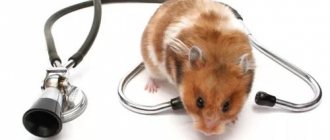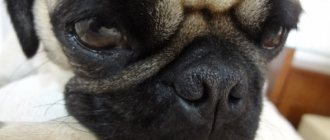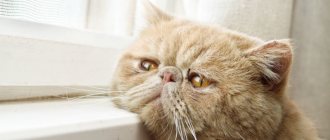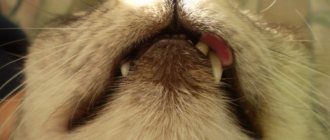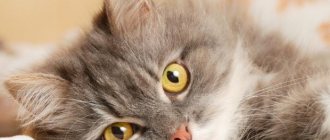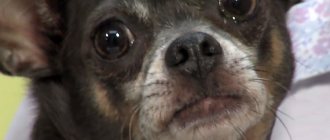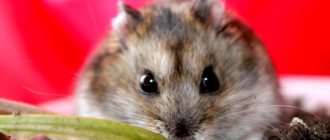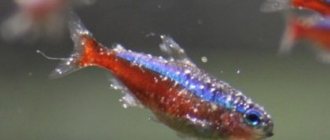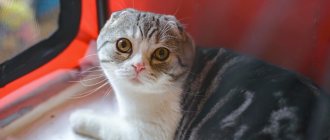Little lumps coming into the world are not only joy, but also a colossal responsibility. For newborn organisms, there are many dangers in the world where they come. Babies can get some diseases in the womb, others are transmitted with milk, and some lie in wait in the first weeks of life. Each disease must be carefully examined and measures taken, since a fragile kitten is unlikely to be able to cope with sometimes quite formidable diseases on its own.
Fading kitten
This pathology develops in the womb.
Causes:
- Placental abruption.
- Wrong choice of paternal line.
- Infectious, viral diseases during pregnancy.
- Incorrectly formulated diet for pregnant and lactating pussy.
Children exhibit the following symptoms:
- Underweight (weight 25% lower than healthy members of one litter).
- Dehydration.
- Lack of physical activity.
- Hypothermia.
Unfortunately, the disease cannot be treated, and the sick pet is doomed. To prevent this situation from happening, you need to take preventive measures even before the kittens appear:
- Follow the expectant mother's vaccination plan.
- Provide the pregnant animal with adequate nutrition.
- Take a responsible approach to choosing the breeding half.
- Maintain good care.
How to protect your kitten from diseases
To protect your little pet, you need to take care of its health even before birth. This will be helped by competent care of the mother, who protects her offspring from infections until vaccinations are given.
Ensuring the normal course of pregnancy of the mother cat
Before mating, it is necessary to undergo all mandatory vaccinations in order to build immunity against the most dangerous viruses, and deworming. During pregnancy, a lot of attention will have to be paid to feeding and living conditions:
- Increase your daily food intake by 10%. In this case, there will be enough nutrients not only for the cat, but also for her offspring.
- Increase the frequency of feedings. Despite the increase in the norm, you cannot feed the daily portion in just 2 meals. Do not overload the stomach and feed your pet 5-6 times a day in small portions.
- Enrich your diet with vitamins and minerals. If your pet eats dry food, then choose a new product designed specifically for pregnant and lactating animals. When feeding natural food, it is better to discuss this issue with your veterinarian. Without preliminary testing, there is a risk of overdoing it or, conversely, not getting enough elements necessary during this period. Such a mistake is fraught with hypo- or vitamin deficiency.
- Create a safe and cozy "nest" to prevent childbirth under the sofa.
- Swap a large play set for a horizontal scratching post. An unsuccessful landing from a high surface can cause miscarriages.
By following these recommendations, your mustachioed pet's pregnancy will be easy and unnoticed. During childbirth, it is better to invite a veterinarian, since in an emergency he will be able to provide first aid.
Pre-vaccination period
This period is one of the most dangerous, but if the mother cat is vaccinated in a timely manner, there is no need to worry about the health of her offspring. For additional prevention, it is recommended to avoid walking outside, not to let small pets out into the hallway, and to put all outdoor shoes along with clothes in a tightly closed closet.
Toxic milk syndrome
This pathology is observed in newborn pets whose mother is sick (metritis or septic mastitis in the acute stage). Manifestations of milk intoxication:
- Pets refuse to suck and squeak loudly.
- The cubs' bellies are inflated.
- Loose stools come out.
- Rapid loss of water in the body begins.
- The anus is inflamed.
- Blood poisoning begins.
For successful treatment, the litter is weaned from breastfeeding and switched to artificial food. Smecta relieves symptoms of diarrhea and bloating.
For prevention, it is necessary to monitor the condition of the nipples and milk in a nursing cat.
Hypogalactia
Such a tricky name hides a very simple reason - lack of lactation in a nursing mother. Milk deficiency leads to malnutrition and malnutrition in babies.
Causes of hypogalactia:
- The cat is primiparous.
- The nursing animal has poor nutrition.
- The litter is too numerous.
To get rid of the problem, you need to provide the mother with a nutritious diet, rich in protein and carbohydrate foods, and supplement the kittens with artificial feeding. At one month of age, you can start introducing complementary foods.
Digestive dilemma
Digestive disorders can manifest themselves in different ways. Your kitten may vomit, have diarrhea, be constipated, or be more lethargic and lethargic. Since kittens are curious creatures, it is possible that his digestive problems are caused by the fact that he ate something he was not supposed to eat. In addition, sometimes various chemicals or oils can get into the kitten's fur, and when the pet washes itself, these harmful substances enter its gastrointestinal tract, which leads to digestive problems. The American Society for the Prevention of Cruelty to Animals (ASPCA) warns against the use of essential oils, cleaning products, and some houseplants that can be harmful or even deadly to cats. If you notice symptoms of gastrointestinal distress in your kitten, monitor him closely for a few hours. In some cases, the problem resolves itself within a day. If your cat refuses to eat, cannot move, or begins to tremble, take her to a veterinarian immediately to rule out acute poisoning.
Hypothermia
From the name it is already clear what the cause of the pathology is. In the absence of a cat and the babies being warmed with their warmth, they lose their body temperature, which drops to 35.6C. This is very little. The cubs freeze and stop moving. The same consequences will occur at low temperatures in the room where the children are.
To bring a cat baby back to life, you need to warm it up gradually, covering it in layers. Pour glucose (5-10%) into the mouth. Be sure to seek help from a doctor. To prevent such situations from happening again, pay careful attention to insulating the cat’s nest.
Signs of feeling unwell
It is important to notice changes in the cat’s well-being in a timely manner, because only timely assistance can be most effective.
Signs that should alert the owner:
- Refusal of food or gluttony. It is worth noting that seasonal changes in your pet's appetite are possible. Usually by winter cats gain weight and therefore eat more, but by summer their appetite drops a little and they lose weight. And yet, a sudden refusal to eat may indicate a pet’s illness, as can a suddenly awakened strong appetite for no reason.
- Apathy, lethargy. Cats are usually quite lazy creatures. As they age, they play less and sleep more. However, a healthy animal should still have periods of activity when it runs around the house, sits on the window and looks at birds, and hunts. If the cat has become inactive, constantly sleeps, is passive, and is not interested in the world around him, this is a reason to sound the alarm.
- Problems with urination, blood in the urine.
- Vomiting and diarrhea. Sometimes cats may vomit for no reason - this is how they clean their stomachs of ingested fur. Still, it’s worth keeping a close eye on your pet. If the vomiting does not stop, or the animal has severe diarrhea, it is necessary to take the pet to the doctor.
- Discharge from nose and eyes.
- Increased body temperature. Normal body temperature in cats is 38-39 degrees.
- Shortness of breath, wheezing, cough.
Street cats are often injured in fights with other cats or dogs. How to cure a cat in this case? If the wound is small, it can be treated with hydrogen peroxide. For more serious injuries - fractures, large lacerations, internal injuries - you should contact a veterinarian as soon as possible. The doctor must stop the bleeding, treat the wound, and fix the broken limb. Usually the animal is injected with an anesthetic. Afterwards, it is advisable to leave the animal in a dark, quiet place where no one will disturb it.
We will list the main diseases of cats, their causes, symptoms and tell you how to cure a cat at home.
Anemia
Kittens suffer from anemia in cases where the mother suffers from it or they are infected with a helminthic infestation.
Signs of anemia in babies:
- Poor development, retardation.
- Pale mucous membranes.
To get rid of the problem, you will have to introduce iron-containing food and vitamins into your diet. To prevent anemia, it is necessary to promptly carry out antiparasitic measures in a pregnant animal and provide adequate feeding.
Types of diseases
The unprotected and fragile organism of pets is susceptible to a huge number of diseases, and some of them are transmitted to the cubs from the mother - in her womb or during feeding with milk.
What diseases do small kittens have?
- Fading kitten syndrome.
- Toxic milk syndrome.
- Hypogalactia.
- Anemia in newborn domestic animals.
- Hemolysis.
- Viral pneumonia.
- Neonatal infectious peritonitis.
- Conjunctivitis.
- Inflammation of the navel.
- Dehydration.
- Hypothermia.
They are also susceptible to pathologies that are typical for adults: helminthiases, distemper, rabies, and the baby is not protected from the effects of fleas and ticks.
Dehydration
In other words, dehydration. It occurs not only against the background of any disease, but also as an independent phenomenon when a small pet is not able to reach breast milk.
Signs of manifestation:
- Dryness of the oral mucous membranes.
- Weak muscle tone.
- Bright red color of the baby's mouth and tongue.
Dehydration can only be treated with veterinary prescriptions. Artificial complementary feeding is used as a preventive measure.
Mr. Cat recommends: features of treating a runny nose in a kitten
A kitten's growing body requires more careful attention when dealing with a runny nose. First of all, it is necessary to improve the living conditions and nutrition of the small pet.
For a speedy recovery, you can do inhalations using eucalyptus oil: you need to add a few drops of oil to a container of hot water, then turn the kitten’s head towards it so that it can inhale the vapors, and cover it with a napkin.
Here you should be careful not to burn your pet.
The warming up procedure will also be useful. To do this, you can use bags of salt or sand.
To ease breathing, children's drops are suitable: Aqua Maris, Pinosol.
Hemolysis
This is the name for blood incompatibility between a cat and its cubs, in which erythrocyte breakdown occurs in the blood of newborns.
Manifestation of the disease:
- Yellow mucous membranes.
- Reluctance to breastfeed.
- Lethargy.
- Brown color of urine.
- Death of tail tissue (at the end).
No treatment has yet been found for this disease, which means the baby is doomed to death. For preventive measures, blood type diagnostics and brown urine testing are used. Once the diagnosis is confirmed, babies are weaned and artificially fed.
Umbilical inflammation
This problem occurs when the umbilical cord is not processed correctly:
- Its remainder is too short or, on the contrary, long.
- The kitten is in unsanitary conditions.
- The cat has problems with her teeth and oral cavity.
A sick kitten's navel is swollen, inflamed and red. Purulent discharge oozes from it. To prevent the development of this situation, you need to properly cut and treat the umbilical cord at birth with antiseptics.
Symptoms that should not be ignored
How can you tell if your pet is sick? If you notice your kitten has discharge from the eyes or nose, sneezing, or difficulty breathing, these could be symptoms of an upper respiratory tract infection. In many cases, some simple antibiotics prescribed by your veterinarian will resolve the problem if he suspects the infection is not viral. However, your veterinarian may recommend blood tests to rule out the possibility that an upper respiratory tract infection is related to a more serious condition. This could be an infection caused by feline leukemia virus (FeLV) or feline immunodeficiency virus (FIV), writes Pet Health Network. Although you may think that upper respiratory problems can be treated at home, it is important to take kittens with symptoms of eye or lung disease to a veterinarian as soon as possible.
Viral pneumonia
A dangerous disease for fragile small organisms. It occurs as a result of viral infections suffered during illness and lack of vaccinations.
Manifestations of the disease in kittens:
- The animal meows pitifully, does not eat breast milk, and refuses to attach to the nipple.
- Body temperature rises.
- Coughing and sneezing begins.
- Mucus is discharged from the nose.
- The oral cavity becomes covered with ulcers.
- Conjunctivitis and lacrimation develop.
Immediate seeking of professional medical help is required. To prevent the occurrence of viral pneumonia, you need to follow the vaccination schedule, exclude contact of the animal with other pets and people, and monitor the cleanliness and temperature of the room.
How can you tell if your pet is sick?
First of all, pay attention to how your pet greets you, whether he runs towards you, or plays with his favorite toys. Sometimes a cat's excessive aggressiveness may not be caused by illness at all, but by your incorrect behavior. Or, on the contrary, the always playful naughty dog suddenly becomes lethargic, sleeps a lot, often purrs in his sleep, and this is sometimes caused not by the animal’s good mood, but by its malaise. During inflammatory processes in a cat’s body, its pulse increases to 200 beats per minute, its breathing rate also becomes higher, which is typical both for high physical activity (for example, a kitten has been running a lot and actively after its ball), and for the development of infection in a small body cats.
Conjunctivitis
Disease of the mucous membranes of the organs of vision occurs in kittens in cases where the mother has had a viral infection, the babies' eyes have been damaged and scratched even before they opened.
Manifestation:
- Purulent leakage from under the eyelids when closed.
- Formation of crusts on the eyelids.
- Redness and swelling of the eyelids.
Boric acid is used to treat conjunctivitis. The kittens' eyes are washed with a 2% solution. Plus, antibacterial eye medications are dripped.
Neonatal infectious peritonitis
Peritonitis of an infectious nature occurs in the absence of necessary vaccinations in a pregnant cat, infectious diseases suffered during the period of waiting for kittens, or weakness of the immune system of the newborn.
Symptoms:
- Cyanosis.
- Labored breathing.
- Exhaustion.
- Weakness.
- Fading.
Unfortunately, this pathology is also not curable. A sick animal must be isolated from the rest of the litter to avoid transmission of infection. For prevention, vaccination measures, limiting contact with other animals and humans, maintaining temperature and sterile conditions are extremely important.
Breeds that are more susceptible to peritonitis than others:
- Burmese cat.
- Persian.
- Abyssin.
- Rex.
- Redgoal.
- Bengal.
Infection
Another common problem in cats is ringworm. The animal may develop bald patches, the cat itches a lot, and red spots and scales appear on the skin. Ringworm is an extremely contagious disease, including for humans. Its appearance is caused by mold fungi. Initially, the disease is localized on the tail, head and ears, and if left untreated, it spreads to the entire body.
How to cure lichen in a cat? It is worth understanding that all the symptoms indicating lichen do not guarantee that it is not some other disease. Therefore, lichen must first be correctly diagnosed. The veterinarian may take a scraping from the cat's skin and send it for analysis or use a Wood's lamp. When making a diagnosis, the doctor must vaccinate the animal.
How to cure a cat's lichen at home? It is worth remembering that lichen is extremely contagious, and therefore it is better to touch the animal only with gloves. It is advisable to temporarily isolate the cat from people and other animals. For treatment, you can use antifungal ointments, baths with lime sulphide, tablets (Itraconazole, Terbinafine, Griseofulvin).
There are also infectious diseases that cats often suffer from: feline distemper, rabies, coronaviruses, calcivirus. The main symptoms of an infectious disease are: high fever, vomiting and diarrhea, apathy, drowsiness. Whether a cat can be cured depends only on the accuracy of the diagnosis and how quickly the animal receives medical help. In the case of infectious diseases, minutes often count.
